Unit 11 How was your school trip? Section B (2a_2c) 课件(共有PPT26张,含视频)
文档属性
| 名称 | Unit 11 How was your school trip? Section B (2a_2c) 课件(共有PPT26张,含视频) | 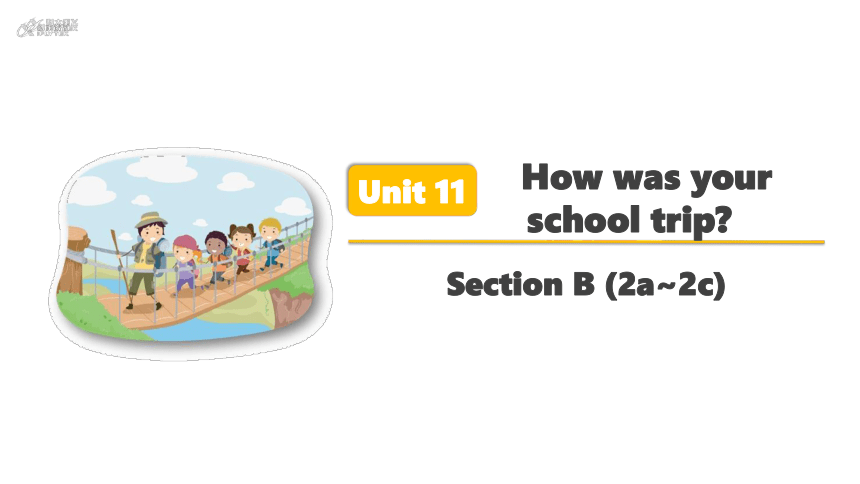 | |
| 格式 | pptx | ||
| 文件大小 | 21.8MB | ||
| 资源类型 | 教案 | ||
| 版本资源 | 人教新目标(Go for it)版 | ||
| 科目 | 英语 | ||
| 更新时间 | 2022-04-07 09:09:58 | ||
图片预览

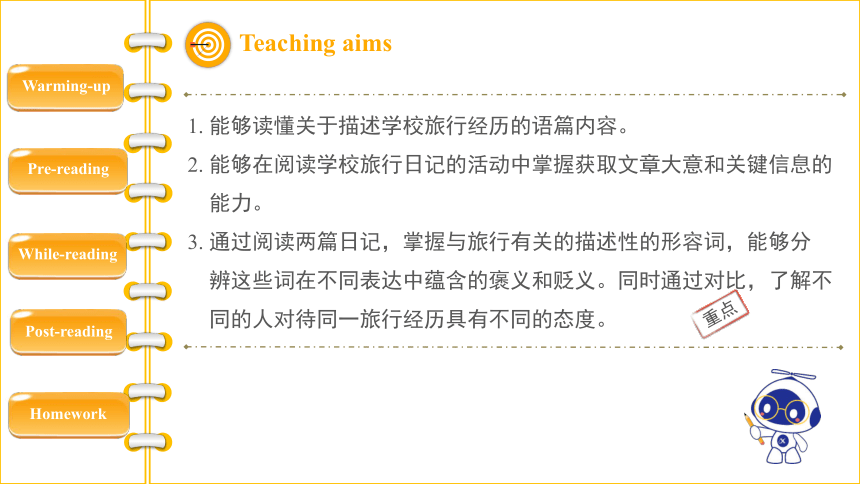
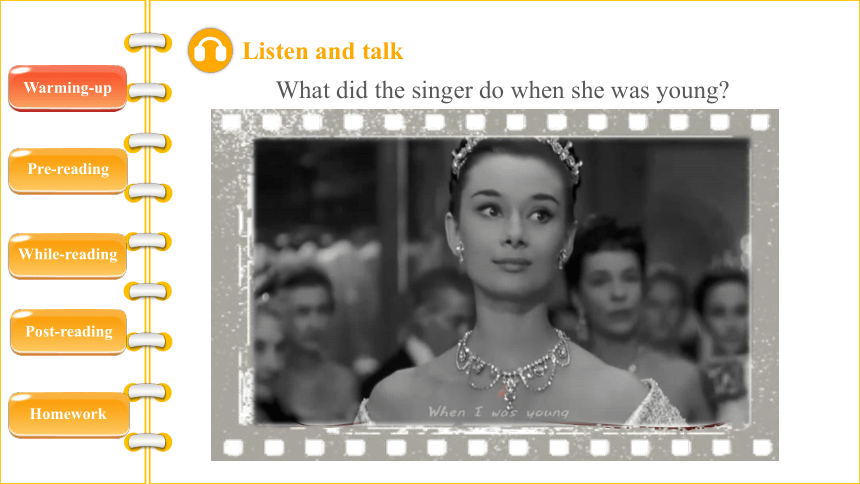
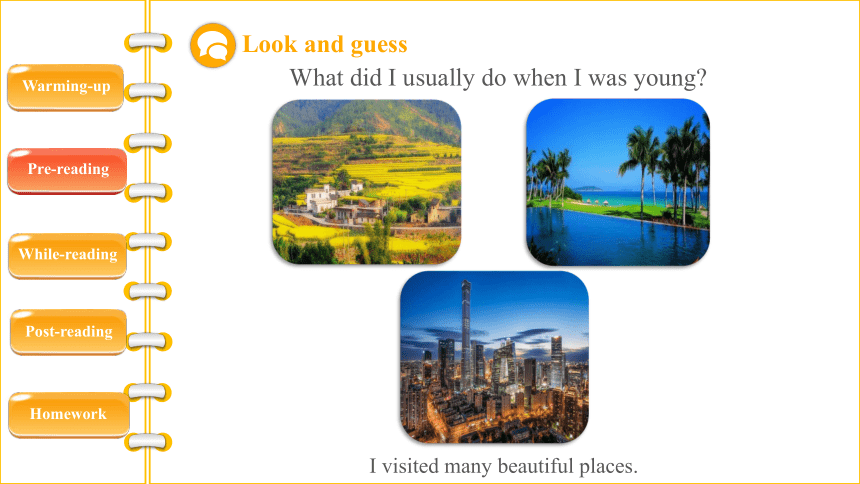
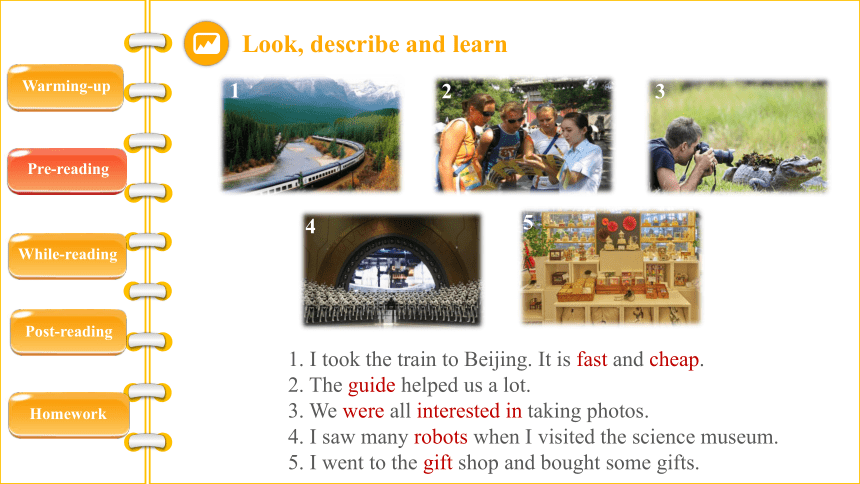

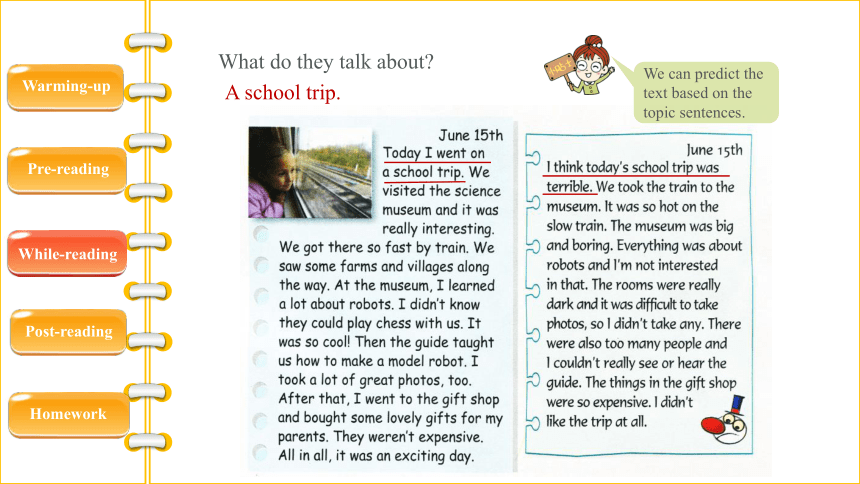
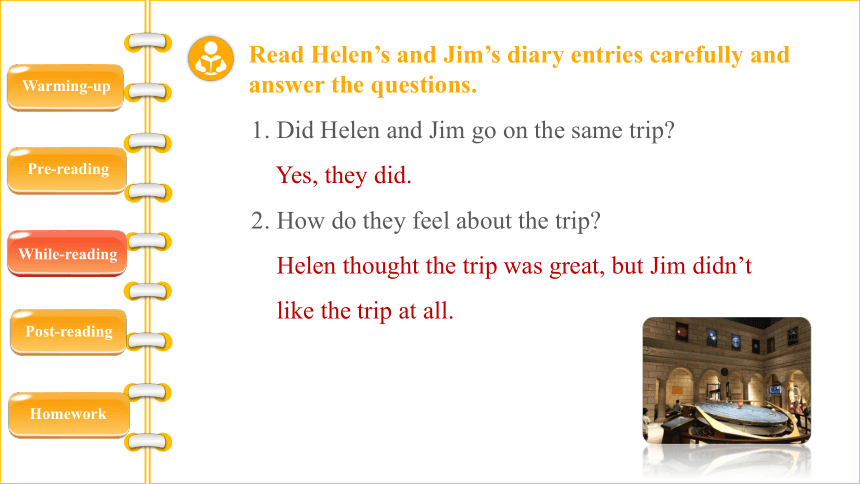
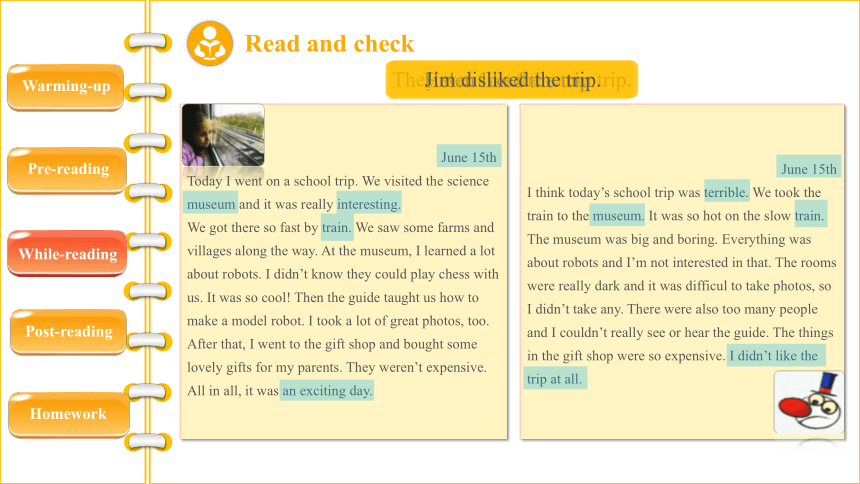
文档简介
(共26张PPT)
How was your school trip
Section B (2a~2c)
Unit 11
1. 能够读懂关于描述学校旅行经历的语篇内容。
2. 能够在阅读学校旅行日记的活动中掌握获取文章大意和关键信息的
能力。
3. 通过阅读两篇日记,掌握与旅行有关的描述性的形容词,能够分
辨这些词在不同表达中蕴含的褒义和贬义。同时通过对比,了解不
同的人对待同一旅行经历具有不同的态度。
重点
Teaching aims
While-reading
Homework
Post-reading
Pre-reading
Warming-up
What did you do when you were a little child
Listen and talk
What did the singer do when she was young
While-reading
Warming-up
Homework
Post-reading
Pre-reading
Look and guess
What did I usually do when I was young
I visited many beautiful places.
While-reading
Homework
Post-reading
Pre-reading
Warming-up
Look, describe and learn
While-reading
Homework
Post-reading
Pre-reading
Warming-up
1. I took the train to Beijing. It is fast and cheap.
2. The guide helped us a lot.
3. We were all interested in taking photos.
4. I saw many robots when I visited the science museum.
5. I went to the gift shop and bought some gifts.
1
2
3
4
5
A. News.
B. Diaries.
C. Stories.
D. Letters.
What are the types of the texts
Observe and answer
While-reading
While-reading
Homework
Post-reading
Pre-reading
Warming-up
A school trip.
What do they talk about
We can predict the text based on the topic sentences.
While-reading
Homework
Post-reading
Pre-reading
Warming-up
Read Helen’s and Jim’s diary entries carefully and answer the questions.
While-reading
Homework
Post-reading
Pre-reading
Warming-up
1. Did Helen and Jim go on the same trip
Yes, they did.
2. How do they feel about the trip
Helen thought the trip was great, but Jim didn’t
like the trip at all.
June 15th
Today I went on a school trip. We visited the science museum and it was really interesting.
We got there so fast by train. We saw some farms and villages along the way. At the museum, I learned a lot about robots. I didn’t know they could play chess with us. It was so cool! Then the guide taught us how to make a model robot. I took a lot of great photos, too.
After that, I went to the gift shop and bought some lovely gifts for my parents. They weren’t expensive.
All in all, it was an exciting day.
June 15th
I think today’s school trip was terrible. We took the train to the museum. It was so hot on the slow train.
The museum was big and boring. Everything was about robots and I’m not interested in that. The rooms were really dark and it was difficul to take photos, so I didn’t take any. There were also too many people and I couldn’t really see or hear the guide. The things in the gift shop were so expensive. I didn’t like the trip at all.
Read and check
While-reading
Homework
Post-reading
Pre-reading
Warming-up
They went on the same trip.
Helen liked the trip.
Jim disliked the trip.
June 15th
Today I went on a school trip. We visited the science museum and it was really interesting.
We got there so fast by train. We saw some farms and villages along the way. At the museum, I learned a lot about robots. I didn’t know they could play chess with us. It was so cool! Then the guide taught us how to make a model robot. I took a lot of great photos, too.
After that, I went to the gift shop and bought some lovely gifts for my parents. They weren’t expensive.
All in all, it was an exciting day.
June 15th
I think today’s school trip was terrible. We took the train to the museum. It was so hot on the slow train.
The museum was big and boring. Everything was about robots and I’m not interested in that. The rooms were really dark and it was difficul to take photos, so I didn’t take any. There were also too many people and I couldn’t really see or hear the guide. The things in the gift shop were so expensive. I didn’t like the trip at all.
Read and circle all adjectives. Then put them into the right column.
While-reading
Homework
Post-reading
Pre-reading
Warming-up
While-reading
Homework
Post-reading
Pre-reading
Warming-up
They can express good or bad feelings in sentences.
Good feelings Bad feelings
interesting
cool
great
lovely
exciting
interested
fast
terrible
slow
boring
dark
difficult
expensive
Read Helen’s diary entry, fill in the blanks and discuss.
While-reading
Homework
Post-reading
Pre-reading
Warming-up
Helen’s trip
Time
Place
June 15th
the science museum
took the train
saw __________________
________________
learned about robots
made _____________
took a lot of great photos
went to the gift shop
farms and villages
cool
a model robot
bought some gifts
lovely,
____________
not expensive
Transportation
Activities and feelings
Read Jim’s diary entry and fill in the blanks.
While-reading
Homework
Post-reading
Pre-reading
Warming-up
Time
Activities and feelings
June 15th
visited _____________
couldn’t __________ the guide
saw many robots
__________ photos
went to the gift shop
hot and slow
the museum
big, boring, dark
__________
____________
expensive
uninterested
didn’t take
see or hear
Jim’s trip
Place
the science museum
___________
Transportation
took the train
Listen and read Helen’s and Jim’s diary entries loudly.
Listen and read
While-reading
Homework
Post-reading
Pre-reading
Warming-up
Retell
While-reading
Homework
Post-reading
Pre-reading
Warming-up
big and boring
Trips
Helen’s trip
Jim’s trip
exciting
terrible
made a model robot
took photos;
went to the gift shop;
bought gifts
visited the science museum;
by train(fast);
saw farms and villages;
learn about robots;
took the train(slow);
museum was big and boring;
rooms are dark;
couldn’t take photos
too many people;
couldn’t see or hear the guide;
gifts were so expensive
While-reading
Homework
Post-reading
Pre-reading
Warming-up
Different people have different opinions about the same thing!
What was your last trip/weekend like Talk about your feelings
and the reasons.
Work in pairs and discuss
While-reading
Homework
Post-reading
Pre-reading
Warming-up
hot; sad
sunny
enjoy ice-cream;
happy
The trip/weekend was great/bad…
…
…
1. Share your discussion with your friends.
2. Preview the new words and phrases in Section B
(3a—3c).
Homework
While-reading
Homework
Post-reading
Pre-reading
Warming-up
1. Today I went on a school trip. 今天我参加了一次学校旅行。
Language points
While-reading
Post-reading
Pre-reading
Homework
Warming-up
go on a trip 意为“去旅行”,相当于have a trip。go on a trip to...意为“到……去旅行”。
Do you want to go on a trip with me
He went on a trip to Shanghai last year.
【拓展】go on常与表示旅行、远足、野餐、航海等的名词连用,意为“去……”。
go on a hike 意为“去远足”;go on a visit 意为“去访问”;
go on a picnic 意为“去野餐”;go on vacation 意为“去度假”。
While-reading
Post-reading
Pre-reading
Homework
Warming-up
(1) guide是可数名词,此处表示人,意为“导游;向导”;还
可以表示事物,意为“指南;入门书”。
The guide showed us around the museum.
【拓展】guide及物动词,意为“带领;引导”。
She guided her students across the road.
(2) how to make a model robot为“疑问词+动词不定式”结构。在此结构中的疑问词包括疑问代词what,which,who和疑问副词when,where,how等。这些疑问词和动词不定式一起构成了动词不定式短语。在句中可作宾语、表语等。
I don’t know how to spell the word.
2. Then the guide taught us how to make a model robot. 然后,导游
教我们怎样制作机器人模型。
While-reading
Post-reading
Pre-reading
Homework
Warming-up
3. After that, I went to the gift shop and bought some lovely gifts for
my parents. 之后,我去了礼品店并为父母买了一些可爱的礼物。
(1) gift是可数名词,意为“礼物;赠品”,与present同义。
He gave her the notebook as a gift.
(2) lovely是形容词,意为“可爱的;美丽的”。
What a lovely girl!
We can see lovely views here.
【拓展】英语中有一些和lovely一样以-ly结尾的词是形容词,而不是副词。如friendly 意为“友好的”;lively 意为“生气勃勃的;鲜艳的”;lonely 意为“孤独的;寂寞的”。
While-reading
Post-reading
Pre-reading
Homework
Warming-up
4. All in all, it was an exciting day. 总之,这是令人兴奋的一天。
all in all 意为“总的说来;总之;整体上说”,常用于句首,用来对所阐述的内容进行概括性总结及归纳。
All in all, it is a great success.
辨析:all in all,in all与at all
all in all 意为“总的说来” 常用于句首 All in all, we had a good time.
in all 意为“总共;合计” 既可放在句首,也可放在句末 There are thirty students in all.
at all 意为“根本” 常用于否定句,not…at all 意为“根本不” He doesn’t like apples at all.
While-reading
Post-reading
Pre-reading
Homework
Warming-up
5. I think today’s school trip was terrible. 我认为今天的学校旅行
非常糟糕。
本句为含有宾语从句的主从复合句。主句为一般现在时态,宾语从句根据具体情况选用所需时态。
I think he is a good boy.
Can you tell me who she is looking for
注意:
当主句是一般现在时,主语是第一人称且谓语是think,believe等词时,如果要对宾语从句进行否定,常把否定转移到主句上来,即“否定前移”。
I don’t think he can answer this question.
While-reading
Post-reading
Pre-reading
Homework
Warming-up
6. Everything was about robots and I’m not interested in that. 一切
都是关于机器人的,我对那方面不感兴趣。
(1) everything是复合不定代词,意为“所有事物;一切”。everything作主语时,谓语动词用单数。
I hope everything goes well.
(2) be interested in sth. 意为“对某事(物)感兴趣”;be interested in doing sth. 意为“对做某事感兴趣”。
I’m interested in the film.
辨析:interesting与interested
interesting 令人感兴趣的;有趣的 常表示某物具有令人感兴趣的特征,常说明事物 可作表语或定语
interested 感兴趣的 常表示某人对某事物感兴趣,常说明人 常作表语
While-reading
Post-reading
Pre-reading
Homework
Warming-up
7. There were also too many people and I couldn’t really see or hear
the guide. 而且,人太多,我看不到导游,也听不清导游的解说。
hear此处用作及物动词,意为“听见;听到”,其过去式为heard。
I heard a strange noise in the middle of the night.
【拓展】
(1) hear sb. do sth. 表示“听见某人做了某事或经常做某事”,hear sb. doing sth. 表示“听见某人正在做某事”。
I often hear the young man sing in the next room.
(2) hear还可用作不及物动词,常见短语:hear of/about 意为“听说”;hear from 意为“接到……的来信(电话等)”。
I heard of/about it yesterday.
Bye-bye!
How was your school trip
Section B (2a~2c)
Unit 11
1. 能够读懂关于描述学校旅行经历的语篇内容。
2. 能够在阅读学校旅行日记的活动中掌握获取文章大意和关键信息的
能力。
3. 通过阅读两篇日记,掌握与旅行有关的描述性的形容词,能够分
辨这些词在不同表达中蕴含的褒义和贬义。同时通过对比,了解不
同的人对待同一旅行经历具有不同的态度。
重点
Teaching aims
While-reading
Homework
Post-reading
Pre-reading
Warming-up
What did you do when you were a little child
Listen and talk
What did the singer do when she was young
While-reading
Warming-up
Homework
Post-reading
Pre-reading
Look and guess
What did I usually do when I was young
I visited many beautiful places.
While-reading
Homework
Post-reading
Pre-reading
Warming-up
Look, describe and learn
While-reading
Homework
Post-reading
Pre-reading
Warming-up
1. I took the train to Beijing. It is fast and cheap.
2. The guide helped us a lot.
3. We were all interested in taking photos.
4. I saw many robots when I visited the science museum.
5. I went to the gift shop and bought some gifts.
1
2
3
4
5
A. News.
B. Diaries.
C. Stories.
D. Letters.
What are the types of the texts
Observe and answer
While-reading
While-reading
Homework
Post-reading
Pre-reading
Warming-up
A school trip.
What do they talk about
We can predict the text based on the topic sentences.
While-reading
Homework
Post-reading
Pre-reading
Warming-up
Read Helen’s and Jim’s diary entries carefully and answer the questions.
While-reading
Homework
Post-reading
Pre-reading
Warming-up
1. Did Helen and Jim go on the same trip
Yes, they did.
2. How do they feel about the trip
Helen thought the trip was great, but Jim didn’t
like the trip at all.
June 15th
Today I went on a school trip. We visited the science museum and it was really interesting.
We got there so fast by train. We saw some farms and villages along the way. At the museum, I learned a lot about robots. I didn’t know they could play chess with us. It was so cool! Then the guide taught us how to make a model robot. I took a lot of great photos, too.
After that, I went to the gift shop and bought some lovely gifts for my parents. They weren’t expensive.
All in all, it was an exciting day.
June 15th
I think today’s school trip was terrible. We took the train to the museum. It was so hot on the slow train.
The museum was big and boring. Everything was about robots and I’m not interested in that. The rooms were really dark and it was difficul to take photos, so I didn’t take any. There were also too many people and I couldn’t really see or hear the guide. The things in the gift shop were so expensive. I didn’t like the trip at all.
Read and check
While-reading
Homework
Post-reading
Pre-reading
Warming-up
They went on the same trip.
Helen liked the trip.
Jim disliked the trip.
June 15th
Today I went on a school trip. We visited the science museum and it was really interesting.
We got there so fast by train. We saw some farms and villages along the way. At the museum, I learned a lot about robots. I didn’t know they could play chess with us. It was so cool! Then the guide taught us how to make a model robot. I took a lot of great photos, too.
After that, I went to the gift shop and bought some lovely gifts for my parents. They weren’t expensive.
All in all, it was an exciting day.
June 15th
I think today’s school trip was terrible. We took the train to the museum. It was so hot on the slow train.
The museum was big and boring. Everything was about robots and I’m not interested in that. The rooms were really dark and it was difficul to take photos, so I didn’t take any. There were also too many people and I couldn’t really see or hear the guide. The things in the gift shop were so expensive. I didn’t like the trip at all.
Read and circle all adjectives. Then put them into the right column.
While-reading
Homework
Post-reading
Pre-reading
Warming-up
While-reading
Homework
Post-reading
Pre-reading
Warming-up
They can express good or bad feelings in sentences.
Good feelings Bad feelings
interesting
cool
great
lovely
exciting
interested
fast
terrible
slow
boring
dark
difficult
expensive
Read Helen’s diary entry, fill in the blanks and discuss.
While-reading
Homework
Post-reading
Pre-reading
Warming-up
Helen’s trip
Time
Place
June 15th
the science museum
took the train
saw __________________
________________
learned about robots
made _____________
took a lot of great photos
went to the gift shop
farms and villages
cool
a model robot
bought some gifts
lovely,
____________
not expensive
Transportation
Activities and feelings
Read Jim’s diary entry and fill in the blanks.
While-reading
Homework
Post-reading
Pre-reading
Warming-up
Time
Activities and feelings
June 15th
visited _____________
couldn’t __________ the guide
saw many robots
__________ photos
went to the gift shop
hot and slow
the museum
big, boring, dark
__________
____________
expensive
uninterested
didn’t take
see or hear
Jim’s trip
Place
the science museum
___________
Transportation
took the train
Listen and read Helen’s and Jim’s diary entries loudly.
Listen and read
While-reading
Homework
Post-reading
Pre-reading
Warming-up
Retell
While-reading
Homework
Post-reading
Pre-reading
Warming-up
big and boring
Trips
Helen’s trip
Jim’s trip
exciting
terrible
made a model robot
took photos;
went to the gift shop;
bought gifts
visited the science museum;
by train(fast);
saw farms and villages;
learn about robots;
took the train(slow);
museum was big and boring;
rooms are dark;
couldn’t take photos
too many people;
couldn’t see or hear the guide;
gifts were so expensive
While-reading
Homework
Post-reading
Pre-reading
Warming-up
Different people have different opinions about the same thing!
What was your last trip/weekend like Talk about your feelings
and the reasons.
Work in pairs and discuss
While-reading
Homework
Post-reading
Pre-reading
Warming-up
hot; sad
sunny
enjoy ice-cream;
happy
The trip/weekend was great/bad…
…
…
1. Share your discussion with your friends.
2. Preview the new words and phrases in Section B
(3a—3c).
Homework
While-reading
Homework
Post-reading
Pre-reading
Warming-up
1. Today I went on a school trip. 今天我参加了一次学校旅行。
Language points
While-reading
Post-reading
Pre-reading
Homework
Warming-up
go on a trip 意为“去旅行”,相当于have a trip。go on a trip to...意为“到……去旅行”。
Do you want to go on a trip with me
He went on a trip to Shanghai last year.
【拓展】go on常与表示旅行、远足、野餐、航海等的名词连用,意为“去……”。
go on a hike 意为“去远足”;go on a visit 意为“去访问”;
go on a picnic 意为“去野餐”;go on vacation 意为“去度假”。
While-reading
Post-reading
Pre-reading
Homework
Warming-up
(1) guide是可数名词,此处表示人,意为“导游;向导”;还
可以表示事物,意为“指南;入门书”。
The guide showed us around the museum.
【拓展】guide及物动词,意为“带领;引导”。
She guided her students across the road.
(2) how to make a model robot为“疑问词+动词不定式”结构。在此结构中的疑问词包括疑问代词what,which,who和疑问副词when,where,how等。这些疑问词和动词不定式一起构成了动词不定式短语。在句中可作宾语、表语等。
I don’t know how to spell the word.
2. Then the guide taught us how to make a model robot. 然后,导游
教我们怎样制作机器人模型。
While-reading
Post-reading
Pre-reading
Homework
Warming-up
3. After that, I went to the gift shop and bought some lovely gifts for
my parents. 之后,我去了礼品店并为父母买了一些可爱的礼物。
(1) gift是可数名词,意为“礼物;赠品”,与present同义。
He gave her the notebook as a gift.
(2) lovely是形容词,意为“可爱的;美丽的”。
What a lovely girl!
We can see lovely views here.
【拓展】英语中有一些和lovely一样以-ly结尾的词是形容词,而不是副词。如friendly 意为“友好的”;lively 意为“生气勃勃的;鲜艳的”;lonely 意为“孤独的;寂寞的”。
While-reading
Post-reading
Pre-reading
Homework
Warming-up
4. All in all, it was an exciting day. 总之,这是令人兴奋的一天。
all in all 意为“总的说来;总之;整体上说”,常用于句首,用来对所阐述的内容进行概括性总结及归纳。
All in all, it is a great success.
辨析:all in all,in all与at all
all in all 意为“总的说来” 常用于句首 All in all, we had a good time.
in all 意为“总共;合计” 既可放在句首,也可放在句末 There are thirty students in all.
at all 意为“根本” 常用于否定句,not…at all 意为“根本不” He doesn’t like apples at all.
While-reading
Post-reading
Pre-reading
Homework
Warming-up
5. I think today’s school trip was terrible. 我认为今天的学校旅行
非常糟糕。
本句为含有宾语从句的主从复合句。主句为一般现在时态,宾语从句根据具体情况选用所需时态。
I think he is a good boy.
Can you tell me who she is looking for
注意:
当主句是一般现在时,主语是第一人称且谓语是think,believe等词时,如果要对宾语从句进行否定,常把否定转移到主句上来,即“否定前移”。
I don’t think he can answer this question.
While-reading
Post-reading
Pre-reading
Homework
Warming-up
6. Everything was about robots and I’m not interested in that. 一切
都是关于机器人的,我对那方面不感兴趣。
(1) everything是复合不定代词,意为“所有事物;一切”。everything作主语时,谓语动词用单数。
I hope everything goes well.
(2) be interested in sth. 意为“对某事(物)感兴趣”;be interested in doing sth. 意为“对做某事感兴趣”。
I’m interested in the film.
辨析:interesting与interested
interesting 令人感兴趣的;有趣的 常表示某物具有令人感兴趣的特征,常说明事物 可作表语或定语
interested 感兴趣的 常表示某人对某事物感兴趣,常说明人 常作表语
While-reading
Post-reading
Pre-reading
Homework
Warming-up
7. There were also too many people and I couldn’t really see or hear
the guide. 而且,人太多,我看不到导游,也听不清导游的解说。
hear此处用作及物动词,意为“听见;听到”,其过去式为heard。
I heard a strange noise in the middle of the night.
【拓展】
(1) hear sb. do sth. 表示“听见某人做了某事或经常做某事”,hear sb. doing sth. 表示“听见某人正在做某事”。
I often hear the young man sing in the next room.
(2) hear还可用作不及物动词,常见短语:hear of/about 意为“听说”;hear from 意为“接到……的来信(电话等)”。
I heard of/about it yesterday.
Bye-bye!
同课章节目录
- Unit 1 Can you play the guitar?
- Section A
- Section B
- Unit 2 What time do you go to school?
- Section A
- Section B
- Unit 3 How do you get to school?
- Section A
- Section B
- Unit 4 Don't eat in class.
- Section A
- Section B
- Unit 5 Why do you like pandas?
- Section A
- Section B
- Unit 6 I'm watching TV.
- Section A
- Section B
- Review of Units 1-6
- Unit 7 It's raining!
- Section A
- Section B
- Unit 8 Is there a post office near here?
- Section A
- Section B
- Unit 9 What does he look like?
- Section A
- Section B
- Unit 10 I'd like some noodles.
- Section A
- Section B
- Unit 11 How was your school trip?
- Section A
- Section B
- Unit 12 What did you do last weekend?
- Section A
- Section B
